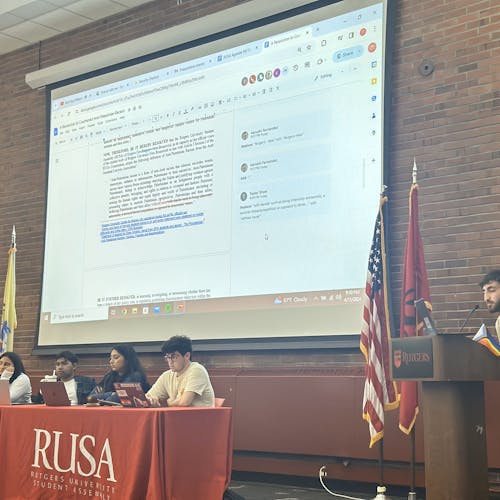Rutgers University College Republicans decline to endorse Trump

The list of Republican politicians and organizations refusing to support the Republican presidential nominee Donald Trump continues to climb.
Joining a significant number of college groups across the country, the Rutgers Republicans are abstaining from endorsing Trump’s candidacy in the 2016 presidential election, citing a lack of agreement among members.
“This election is particularly divisive, and our leadership team and our organization as a whole can’t reach a consensus on whether or not any candidate in this election represents the Republican Party’s core values,” said Najum Junaid, vice-chairman of the Rutgers Republicans.
When asked if the group would officially not support Trump this semester, the School of Arts and Sciences junior said they are not “seeking to promote a particular candidate.”
The student political group will instead focus on the concurrent down-ticket and local races in New Jersey this November.
The decision by the Rutgers Republicans exemplifies the hurdles Trump faces in courting millennial voters and his already bleak prospects on college campuses. Student Republican organizations at Harvard University, Pennsylvania State University and Princeton University have either announced that they will not back the outspoken businessman or have decided to not take a definitive position on his candidacy.
High-profile party leaders like the Bush family, Sen. Lindsey Graham (R-SC) and 2012 presidential nominee Mitt Romney (R-MI) have also declined to vouch their support for Trump.
“The way he’s acted on his campaign trail and the way he’s acted previously don’t give a good indication of who he’ll be as a president,” Junaid said. “That’s kind of why a lot of people don’t want to support him immediately.”
Since launching his presidential campaign last June, Trump has made controversial remarks that have garnered substantial opposition while energizing his supporters, who elected him as their party’s nominee with more than 16 million votes — the highest number of primary votes for a single candidate in the history of the GOP.
His Muslim travel ban and immigration platform, which includes creating a “deportation task force” and building a wall on the southern border, have been criticized by individuals from both sides of the aisle.
When asked whether the Rutgers Republicans support these proposals, Junaid said he could not comment on Trump’s policies.
Although he has recently tried to expand his outreach to minority groups, the Republican nominee continues to have dismal support from black people, Hispanics, Asian Americans and other ethnic minorities — which will account for 31 percent of the eligible electorate this November, according to the Pew Research Center.
Only 8 percent of black voters back a Trump presidency, while 87 percent support Democratic presidential nominee Hillary Clinton, according to a recent NBC News/SurveyMonkey poll. Among Hispanics, Trump trails Clinton by 51 percentage points, with 73 percent of Hispanic voters supporting the former First Lady and 22 percent preferring the Republican nominee.
The same survey found that 66 percent of Asian American voters support Clinton, compared to 23 percent who back Trump.
His campaign’s failure to make inroads with voters in minority communities suggests Trump will have an almost insurmountable task in winning a majority of votes at Rutgers.
During the 2015-2016 school year, 41.5 percent of students at Rutgers were white, 26 percent Asian, 13 percent Hispanic, 7.5 percent black, 7.2 percent were international students and 5 percent identified themselves as “other,” according to the University.
“I think in Rutgers particularly, (Trump’s) positions — that some feel infringe on the rights of minorities — may hinder him on campus, but on college campuses Republican candidates don’t do particularly well overall,” Junaid said.
The vice-chairman of the Rutgers Republicans said the Trump campaign would be more successful if it improved on its messaging, especially towards conservatives, who Junaid believes have not been fully briefed on the candidate’s authentic political ideology.
Junaid emphasized that the group's refusal to back the real estate businessman does not mean the student political group is throwing their support behind former Sec. of State Hillary Clinton.
Rather, he would ask Republicans to “vote their conscience up and down the ticket” on Nov. 8.
Camilo Montoya-Galvez is a School of Arts and Sciences first-year student majoring in Spanish and journalism and media studies. He is a correspondent for The Daily Targum. Follow him on Twitter @camiloooom.



